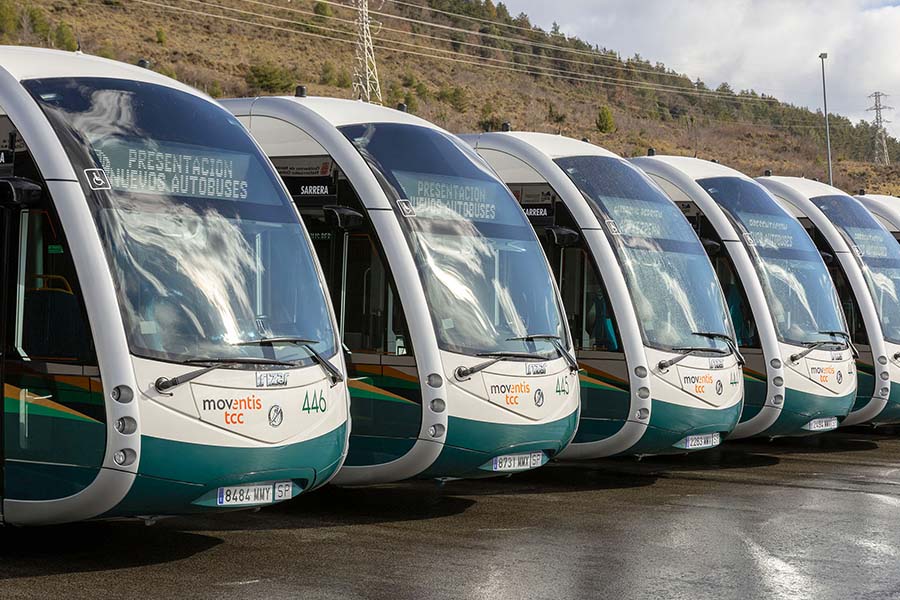Iberdrola España is committed to decarbonise public transport and facilitates the charging of over 550 electric buses
-
The commitment is part of the company's Sustainable Mobility Plan and aims to achieve more sustainable cities.
-
The company accompanies operators and administrations all along the way, contributing its experience, knowledge and infrastructure.
-
Iberdrola España's proposal includes the long-term supply of energy with a 100% renewable energy guarantee.

Iberdrola España provides daily charging to over 550 electric buses and expects to continue helping to decarbonise more vehicles in the coming months. This commitment is part of the company's Sustainable Mobility Plan and aims to achieve more sustainable cities, free of carbon emissions thanks to the supply of energy guaranteed to be 100% renewable.
Among the urban transport electrification projects that the company is carrying out, the most noteworthy are in Madrid, Barcelona, Valencia, Valladolid, Alcorcón, Algeciras, Elche, Pamplona, Alicante, Girona, Móstoles and Braga (Portugal), among others.
The more than 550 charging points are equipped with power ratings starting mostly at 100 kW and reaching up to 360 kW. These chargers are connected to the buses by cable or, in some cases, with overhead pantograph technology on the top of the bus.
All the equipment supplied and installed by Iberdrola España is from the most recognised and proven manufacturers on the market. In addition, the company has a laboratory where its own technicians test the different chargers before installing them.
Iberdrola España accompanies operators and administrations all along the way, contributing its experience, knowledge and infrastructure. From the preliminary analysis, where the operation is studied, charging needs are detected, and the best ones are proposed. Even the implementation of a smart charging platform that optimises the entire operation of the infrastructure and ensures the most efficient operation of the installation at the lowest cost.
The company's proposal includes the supply of energy with a guarantee of 100% renewable source and with very competitive long-term offers. In addition, in some cases it complements the plans with solar self-consumption, which allows for additional savings.
More economical and sustainable
The transport sector is responsible for almost a quarter of greenhouse gas emissions in Europe. Each combustion bus emits 60-70 tonnes of CO2 through its exhaust, without taking into account micro-particulates, which are highly harmful to health, or emissions of hydrocarbons (HC) and Volatile Organic Compounds (VOC).
Among all the existing and proposed mobility technologies for urban buses, the 100% electric bus is the one that allows the total reduction of emissions with maximum reliability, safety and comfort, while ensuring compliance with the objectives of renewable energy use and energy efficiency.
The electric bus, in addition to being more sustainable, is more competitive than the fossil-fuelled bus. Although the initial investment is higher, the savings of up to 70% in fuel costs and 30% in maintenance make the total life cycle cost of an electric bus lower.
Along the same lines, electricity supply costs provide greater stability in operating plans, as they offer the possibility of carrying out contracts for specific periods of time, with very competitive and advantageous prices compared to the fossil fuel option.
In addition to these benefits, these vehicles are also more comfortable as they produce less noise and vibrations.
Leader in mobility
With 6,000 public charging points guaranteed to be 100% renewable, Iberdrola España's electric mobility network is the largest in Spain. In total, between public and private charging points, the company's network has 45,000 chargers.
The mobility plan, launched by the company in 2016, was pioneering in its implementation. Today, its strategy envisages the installation of over 100,000 charging points by 2025, including public charging points, residential, companies and car parks.
The design of its public infrastructure is being developed on highways and corridors as well as in cities and small towns with the aim of having at least one fast charging station every 50 km or less.
The company's goal for 2024 is to provide users with an even more extensive infrastructure with the best range of charging locations and speeds. Its plans for the coming year include the installation of more than 3,000 additional charging points – bringing the total to over 9,000 by the end of the year, to which should be added the high-power charging network resulting from its alliance with bp.
Grupo Iberdrola
